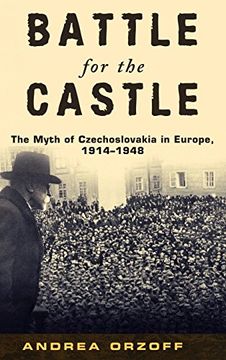Battle for the Castle: The Myth of Czechoslovakia in Europe, 1914-1948 (en Inglés)
Reseña del libro "Battle for the Castle: The Myth of Czechoslovakia in Europe, 1914-1948 (en Inglés)"
After World War I, diplomats and leaders at the Paris Peace Talks redrew the map of Europe, carving up ancient empires and transforming Europe's eastern half into new nation-states. Drawing heavily on the past, the leaders of these young countries crafted national mythologies and deployed them at home and abroad. Domestically, myths were a tool for legitimating the new state with fractious electorates. In Great Power capitals, they were used to curry favor and to compete with the mythologies and propaganda of other insecure postwar states. The new postwar state of Czechoslovakia forged a reputation as Europe's democratic outpost in the East, an island of enlightened tolerance amid an increasingly fascist Central and Eastern Europe. In Battle for the Castle, Andrea Orzoff traces the myth of Czechoslovakia as an ideal democracy. The architects of the myth were two academics who had fled Austria-Hungary in the Great War's early years. Tomáas Garrigue Masaryk, who became Czechoslovakia's first president, and Edvard Benes, its longtime foreign minister and later president, propagated the idea of the Czechs as a tolerant, prosperous, and cosmopolitan people, devoted to European ideals, and Czechoslovakia as a Western ally capable of containing both German aggression and Bolshevik radicalism. Deeply distrustful of Czech political parties and Parliamentary leaders, Benes and Masaryk created an informal political organization known as the Hrad or "Castle." This powerful coalition of intellectuals, journalists, businessmen, religious leaders, and Great War veterans struggled with Parliamentary leaders to set the country's political agenda and advance the myth. Abroad, the Castle wielded the national myth to claim the attention and defense of the West against its increasingly hungry neighbors. When Hitler occupied the country, the mythic Czechoslovakia gained power as its leaders went into wartime exile. Once Czechoslovakia regained its independence after 1945, the Castle myth reappeared. After the Communist coup of 1948, many Castle politicians went into exile in America, where they wrote the Castle myth of an idealized Czechoslovakia into academic and political discourse. Battle for the Castle demonstrates how this founding myth became enshrined in Czechoslovak and European history. It powerfully articulates the centrality of propaganda and the mass media to interwar European cultural diplomacy and politics, and the tense, combative atmosphere of European international relations from the beginning of the First World War well past the end of the Second.

